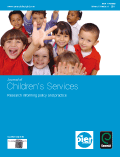The purpose of this paper is to map the current organisation and implementation of children’s services in three regions of Spain, to identify strengths and gaps and to suggest proposals for improvement in line with European recommendations.
The study used an exploratory case study design and relied on qualitative methods, including the answers to open questionnaires provided by senior civil servants at key regional child welfare agencies, children’s services directors and service providers.
The main finding from the review of the legislation and the answers to the questionnaires is that public social services still follow an assistance logic rather than a social investment approach in regards to children’s services. Although a significant development of laws and policies has taken place, ensuring the implementation, monitoring and evaluation of programmes and services for children remains a challenge.
This paper contributes to the evaluation of the current situation of children’s services in Spain from a decentralised perspective with the aim to facilitate changes to improve planning, implementation and evaluation of children’s services and secure better outcomes for children.

